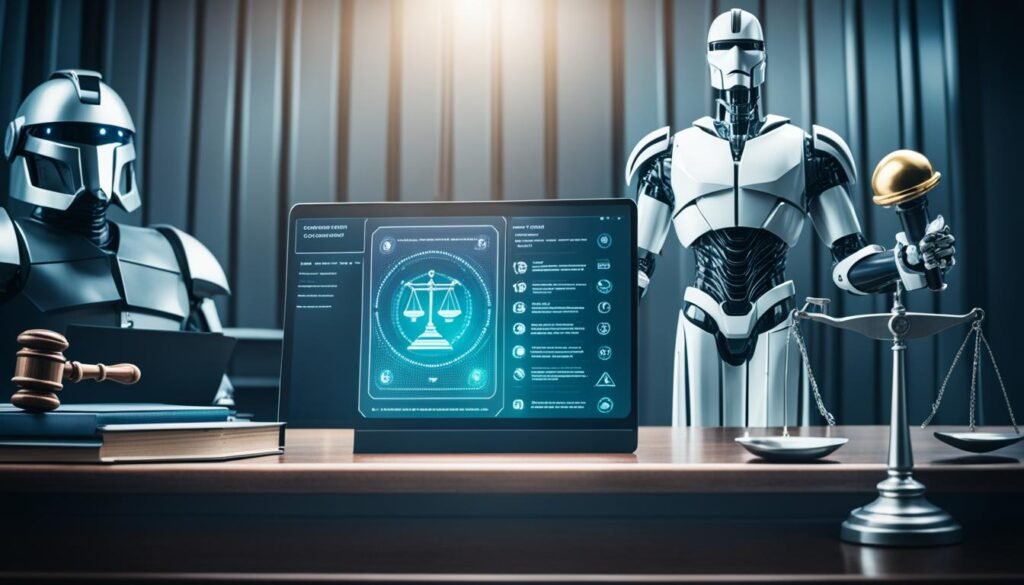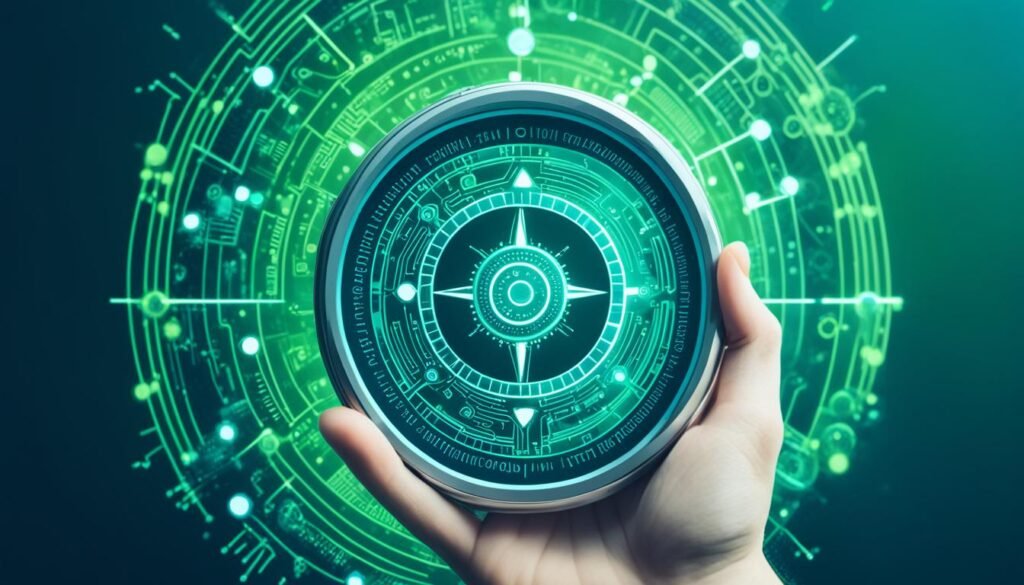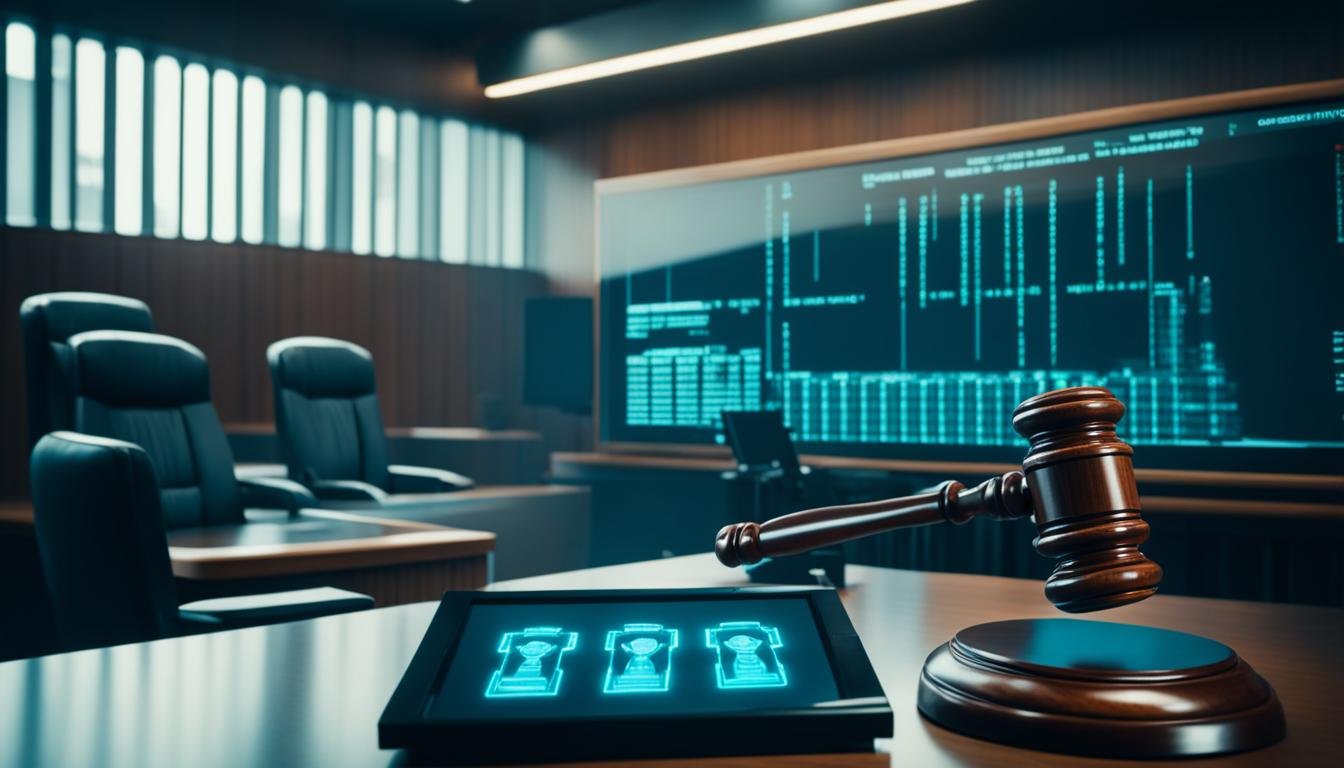AI touches almost every part of our lives today. It changes how we get information and work. Now, AI is making its mark in the legal world too. Lawyers are using it to work smarter and automate some tasks.
But, with new tech comes new ethical questions. This article will look at four big ethical issues with AI in law. These issues are bias and fairness, accuracy, privacy, and legal responsibility and accountability. We’ll see what steps lawyers can take to handle these problems.
Key Takeaways
- Only 10% of lawyers believe generative AI tools will have a transformative impact on law practice.
- 60% of lawyers have no immediate plans to use AI technology.
- 88% of lawyers and law students are aware of AI technology.
- Ethical principles emphasize the importance of transparency, accountability, and human-centered AI development.
- Lawyers have a professional duty to maintain competence in the use of technology, including AI, to provide effective representation to clients.
The Rise of AI in Law
Artificial intelligence (AI) is changing the legal world fast. Legal experts are using it to work better and automate simple tasks. The growth of AI in legal practice is making big changes in the legal world.
AI’s Rapid Adoption in Legal Practice
The Initiative on Artificial Intelligence and the Law (IAIL) at Harvard Law School leads the way in AI and law. It’s led by experts Oren Bar-Gill and Cass Sunstein. The team includes top law teachers like Chris Bavitz, Yochai Benkler, and Jonathan Zittrain.
IAIL looks into many AI topics in law, from Algorithmic Harm in Consumer Markets to Artificial Intelligence in the Judiciary. This work shows how important it is to understand AI’s effect on law.
Benefits and Challenges of AI in the Legal Field
The benefits of AI in law are clear. AI helps lawyers sort through lots of data, finds case laws, and does boring tasks like document review. This lets lawyers focus on important work.
But, there are challenges of AI in law too. We need to think about privacy, lawyer skills, and making sure AI doesn’t break the law. It’s important to be clear about AI’s limits and keep it ethical in law.
| Benefits of AI in Law | Challenges of AI in Law |
|---|---|
|
|
As AI changes the legal world, finding a balance is key. Working together between lawyers and tech experts is important. With strong ethical rules, the legal field can use AI’s power right, keeping up professional standards and serving clients well.
Key Ethical Considerations of AI in Law
AI is becoming more common in law, and lawyers must think about its ethical sides. It’s important to use AI right and keep it in line with legal values.
Bias and fairness are big concerns. AI might keep or make biases worse, leading to unfair decisions. Lawyers need to watch for bias and fix these problems.
Accuracy and transparency are also key. Lawyers should know AI’s limits and make sure the info it gives is trustworthy. Being open about AI use helps keep clients trusting and respects professional rules.
Privacy and data rules are vital too. Lawyers must keep client secrets safe and make sure AI use follows data privacy laws.
Lastly, responsibility and accountability matter. Lawyers need to set clear roles and be clear about who is accountable when using AI.
By looking at these ethical points, lawyers can use AI well and keep legal standards high. As AI grows, staying alert and using it wisely is key for the legal world.

| Ethical Consideration | Key Challenges |
|---|---|
| Bias and Fairness | Potential perpetuation of societal biases in AI-driven decision-making |
| Accuracy and Transparency | Ensuring the reliability and verifiability of AI-generated information |
| Privacy and Data Governance | Protecting client confidentiality and compliance with data privacy laws |
| Responsibility and Accountability | Clearly defining roles and responsibilities when using AI in legal practice |
As lawyers use more AI, dealing with these ethical issues is key. It helps keep the profession honest and makes sure AI is used right and ethically.
ai ethics law
As AI technology grows in the legal world, we must think about its ethical sides. We’re worried about algorithmic bias and the need for clear AI systems.
Bias and Fairness in AI Algorithms
AI uses big datasets to find trends and make choices. But, if the data is biased, so will the AI’s results. This can hurt the legal system, making it unfair and unjust. Lawyers need to watch out for biases in AI to keep things fair.
Accuracy and Transparency of AI Systems
AI algorithms are complex, making it hard to see how they make decisions. This is a big issue in law, where AI choices can really affect people’s lives. Lawyers should make sure AI is both accurate and clear about how it works.
By looking at these ethical issues, lawyers can use AI without losing the justice and fairness we value.
| Ethical Consideration | Importance for Legal Profession | Strategies for Mitigation |
|---|---|---|
| Algorithmic Bias | Can undermine principles of justice and equal treatment under the law | Careful data curation, algorithmic auditing, and monitoring for biases |
| AI Transparency | Crucial for understanding decision-making process and ensuring accountability | Demand transparency from AI vendors, employ expert auditors, and proactively communicate AI limitations |
Privacy and Data Governance
AI systems are getting more advanced, making it crucial to focus on privacy and data governance. These technologies use a lot of sensitive data, like personal info and chat records. Lawyers must make sure to follow strict privacy rules and use data only for its intended purpose when using AI.
Keeping client info private is a key rule for lawyers. When adding AI to their work, lawyers need to think about how to keep this info safe. They should avoid sharing sensitive data without permission. Using strong access controls, encryption, and checking data use is key to keeping privacy safe.
| Data Privacy and Governance Practices | Benefits |
|---|---|
|
|
Lawyers can use AI safely by focusing on ai privacy and data governance. They should manage data well, do regular checks, control access, and keep detailed records. This helps use AI responsibly in law.

“Integrating AI into legal practice requires meticulous attention to privacy and data governance issues. Lawyers must prioritize the protection of sensitive information and ensure they are fully compliant with all relevant regulations.”
Responsibility and Accountability
As AI becomes more common in law, it’s key to set clear rules for who is responsible and accountable. AI can make some tasks easier, but it can’t replace a lawyer’s expertise. Lawyers must check the work of AI to make sure it’s up to their standards and ethical.
Establishing Clear Lines of AI Accountability
Figuring out who is to blame for AI mistakes is tricky. Lawyers need to be ahead of the game in setting up accountability systems in their firms. This means:
- Clearly defining the roles and responsibilities of key people, like lawyers, AI makers, and data suppliers.
- Setting up strong testing and watch systems to check how well and ethically AI systems work.
- Creating rules and policies for how AI should be used and what to do if there are AI problems.
- Working with rule-makers to follow AI laws and rules as they come out.
By doing these things, law firms can make sure they’re accountable, gain trust, and look out for their clients’ needs with AI technology.
| Accountability Challenges | Proposed Solutions |
|---|---|
| Diffused responsibility across black-box AI systems | Detailed record-keeping, oversight committees, and explainable AI |
| Automated decision-making errors in critical sectors | Testing, guidelines, regulations, and shared accountability models |
| Lack of transparency and agency for stakeholders | Prescriptive accountability rules and data quality evaluation frameworks |
By setting clear ai accountability and responsibility for ai, law firms can make sure AI use matches their ethical values and what’s best for their clients.
Professional Ethics and AI Competence
The legal world is quickly adopting artificial intelligence (AI). Lawyers must keep up with the highest ethical standards. AI can make legal work better, but lawyers must use it wisely to meet their duties to clients and the justice system.
Maintaining Ethical Standards with AI Adoption
Lawyers have a key duty to give their clients the best legal help. This now includes using AI wisely and ethically. They need to know the limits and biases of AI, check AI’s work, and be sure the info used in legal decisions is correct and true.
- Lawyers should be careful with generative AI. It can make false or biased info that goes against their ethical duties.
- It’s important to check AI’s work well before using it in court or for client needs.
- Lawyers shouldn’t rely too much on AI. It might stop them from doing the deep analysis needed for good legal work.
Using AI in law must follow all laws, rules, and ethical standards. Lawyers need to make sure AI use, especially in privacy, patents, and online safety, meets all legal and ethical rules.
Lawyers must also be open with their clients about AI use. They should talk about the good and bad sides of AI and how they keep the info used for clients right and true.
“The legal profession has traditionally met the duty of competence through methods like continuing education and the creation of legal specialties, and now it is supplementing these methods with the use of AI.”
As AI gets more common in law, we might see new legal specialties. Lawyers need to get better at using AI in a smart and ethical way. This ensures they can still do their job well for their clients and the justice system.
Legal and Regulatory Landscape
AI is becoming more common in legal work, but the rules around it are still changing. Right now, there are no specific rules from the American Bar Association or state bars on AI use by lawyers. But, lawyers must follow rules about competence, communication, confidentiality, and supervision when using AI.
As AI gets better, we’ll likely see more laws about its use in law. Lawyers need to keep up with these changes to use AI the right way.
Current and Emerging AI Laws and Regulations
AI laws and rules are changing fast, with some big updates recently:
- The proposed American Data Protection and Privacy Act and state laws in nearly a dozen U.S. states, plus the EU’s AI Act.
- The U.S. HIPAA and the EU and UK’s GDPR, which set rules for sharing personal health info.
- The European Commission’s Ethics Guidelines for Trustworthy AI, aiming for AI that respects basic rights and values.
- A U.S. Executive Order on safe and transparent AI, protecting privacy and civil rights and helping workers.
- The FDA has approved over 690 AI medical devices, mostly for radiology, and is working to regulate AI, including language models, for patient safety.
As laws keep changing, lawyers must keep up and adjust their work to follow the latest AI rules.
“93% of professionals in these industries recognize the need for regulation concerning AI.”
Creating good rules for AI in law needs a strong plan. Experts suggest having a central group to make AI policies and keep everyone in line.
Principles for Responsible AI Development
The legal world is adopting responsible AI development. It’s key to guide these systems with ethical rules and social responsibility. Important rules include making sure AI is fair and unbiased, clear and understandable, and keeps data safe. It’s also vital to have clear accountability and focus on what’s best for clients and society.
Lawyers and tech companies must work together. They need to put these rules into AI tools used in law. This means:
- Creating AI that treats everyone equally and doesn’t show bias, like avoiding job ads that unfairly target certain groups.
- Ensuring AI works well in all situations, both normal and unexpected, to prevent harm, like how some credit limits were set unfairly by Apple.
- Being open, clear, and easy to understand to build trust and be accountable, like when Microsoft’s chatbot Tay was shut down for its offensive tweets.
- Putting privacy first by giving clear notices, using safe designs, and making sure users have control over their data, as laws like GDPR and HIPAA require.
- Setting clear who is responsible for making, using, and checking AI in law, so everyone knows who to turn to.
By following these rules of AI development, lawyers can use technology without losing their ethical values. This teamwork is key as AI changes fields like healthcare, security, and transport.
“Responsible AI development is not just about following rules – it’s about making sure technology matches our values and helps society.”

Case Studies and Real-World Examples
AI is becoming more common in law, so it’s important to look at real examples. One way AI is used is in predicting if someone will commit a crime again. But, these predictions can be wrong if the data used is biased.
Another area is using AI for quick translations in court. This can make things easier and faster. But, we need to make sure the translations are accurate and fair for everyone.
Looking at how AI is used in law gives lawyers and legal experts important lessons. They learn about the challenges and how to use AI right. This helps them make choices that are fair, open, and responsible.
Algorithmic Bias and Facial Recognition
A study from MIT and Stanford University looked at how AI sees faces differently. They found that AI made more mistakes with women and people with darker skin. This shows we need to fix biases in AI technologies.
| Facial Recognition Error Rates | Light Skin | Dark Skin |
|---|---|---|
| Male | 0.1% | 0.8% |
| Female | 0.3% | 34.7% |
This shows we must think about ethics when making AI models. We need to ask tough questions to avoid bias.
“Weapons of Math Destruction” by Cathy O’Neil talks about the dangers of algorithms in making decisions. She says we need more openness and responsibility with AI.
As AI becomes more popular in law, we must stay alert and tackle ethical issues. This ensures AI is used fairly and responsibly.
Best Practices for Ethical AI Implementation
As AI becomes more common in law firms, lawyers must use it ethically and responsibly. They should understand how AI works and its limits. They also need to check AI’s work for biases and keep a close eye on how it’s used in the firm.
Strategies for Mitigating AI Risks and Biases
Lawyers should set clear rules for who is responsible and talk openly with clients about AI. This way, they can use ethical ai implementation to their advantage. It helps them meet their duties to clients and the legal field.
- Learn about AI’s inner workings and its limits to spot risks and biases.
- Use strong checks to review AI’s work carefully.
- Keep a close watch on how AI is used in the firm to make sure it’s ethical.
- Make sure everyone knows who is in charge of AI use.
- Tell clients clearly about AI and its effects on their cases.
By following these steps to mitigate ai risks, law firms can benefit from AI safely. They can keep their ethical standards high.
| Key Ethical AI Risks | Potential Consequences | Mitigation Strategies |
|---|---|---|
| Algorithmic Bias | Unfair and discriminatory decision-making | Rigorous bias testing, diverse data sets, transparent algorithms |
| Lack of Transparency | Undermined trust and difficulty in accountability | Explainable AI models, clear communication of AI capabilities and limitations |
| Privacy and Data Misuse | Breaches of client confidentiality and security | Robust data governance, compliance with regulations, secure data practices |
By tackling these ethical issues early, law firms can make the most of AI. They can keep their professional standards and serve their clients well.

“The responsible development and deployment of AI is one of the defining challenges of our time. By adopting a rigorous, ethical approach, we can harness the immense power of this technology to benefit society while mitigating the risks.”
Conclusion
As AI becomes more common in law firms, legal pros must think about its ethical use. They need to worry about bias, accuracy, privacy, and who is responsible. Lawyers should know these issues and act to reduce risks. This means understanding the tech, checking its work, and keeping a close watch.
This way, lawyers can use AI’s benefits without losing their ethical standards. As laws and tech change, staying updated and using AI ethically is key for lawyers. This approach helps the legal world use AI in a responsible, clear way, sticking to legal values.
Adding AI to legal work brings both new chances and tough ethical problems. By facing these problems directly, lawyers can make sure AI helps, not hurts, the justice system. By working hard to manage and control AI, lawyers can set a standard for ethical AI use. This benefits their clients and society greatly.
FAQ
What are the key ethical considerations when using AI in law?
Using AI in law raises big ethical questions. These include bias and fairness, accuracy and transparency, privacy, and responsibility.
How can lawyers address algorithmic bias in AI systems?
Lawyers must watch for biases in AI systems. They should check the data used to train the algorithms and look for unfair treatment in the results.
What transparency and accuracy standards should lawyers expect from AI technology?
Lawyers need AI to be clear and precise. They should know how the algorithms work and understand the info they get.
How should lawyers handle privacy and data governance when using AI?
Lawyers must make sure AI follows strict privacy rules. They should only use data for its intended purpose and respect their duties on privacy.
Who is responsible for errors or issues that arise from the use of AI in law?
Lawyers must set clear rules for who is responsible with AI. They are accountable for their work and their clients’ interests, even with AI’s help.
How can lawyers maintain ethical standards as they adopt AI in their practices?
Lawyers should be careful with AI, checking for bias and staying updated on rules. They must use AI in a way that respects ethical standards.
What are the key principles for responsible AI development in the legal industry?
Responsible AI in law means avoiding bias, being clear, protecting privacy, and setting clear accountability. It also means putting clients and the public first.
Can you provide examples of how AI has been applied in legal contexts?
AI can help in legal areas like predicting recidivism, but it can also reflect biases if the data is wrong. Another example is using AI for quick translation in court, where quality is crucial.
What are some best practices for lawyers to implement AI ethically?
Lawyers should deeply understand AI and its limits. They should check AI outputs for bias and keep a close watch on AI use in their firms. It’s important to be open with clients about AI and its effects.
